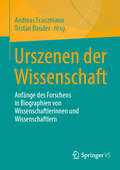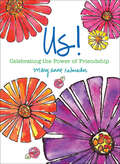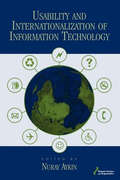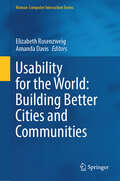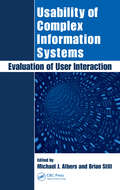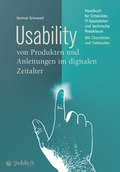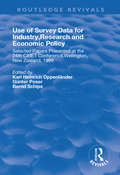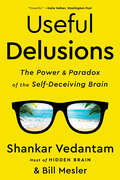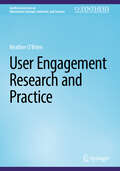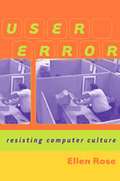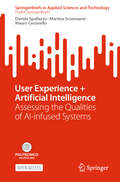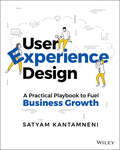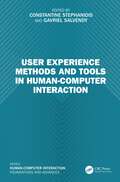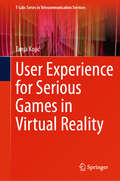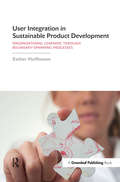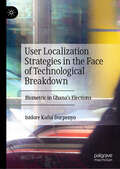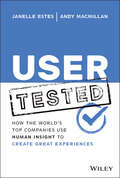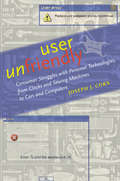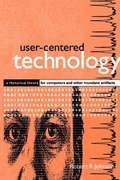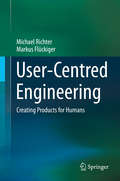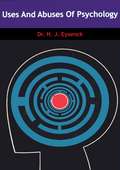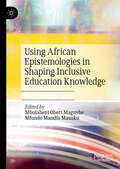- Table View
- List View
Urszenen der Wissenschaft: Anfänge des Forschens in Biographien von Wissenschaftlerinnen und Wissenschaftlern
by Andreas Franzmann Tristan BauderWelche Bildungsprozesse in Kindheit und Jugend bereiten eine spätere Berufslaufbahn in den Wissenschaften vor? Warum ergreifen Menschen den Forscherberuf? Und wie weit lassen sich ihre persönlichen Forschungsthemen lebensgeschichtlich zurückverfolgen? Anhand exemplarischer Fallstudien zu Lebensläufen von Forscherinnen und Forschern aus den Natur-, Geistes- und Sozialwissenschaften rekonstruiert der Band die Anfänge wissenschaftlicher Bildungsbiographien, wie sie sich aus autobiographischen Texten und Interviews erschließen lassen. Erste erinnerbare Begegnungen mit einem späteren Thema der Forschung, Szenen aus Schule und Peer Group, Selbstaktivitäten des Sammelns, Grabens, Erkundens, Diskutierens. Die Studien machen sichtbar, dass sich eine biographische Disposition zum Beruf der Wissenschaft oft schon früh herausbildet, wenn auch viele Umwege gegangen werden müssen. Diese Disposition scheint immer getragen von einer individuellen Faszination für Gegenstände und Phänomene, Rätsel und Methoden ihrer Erschließung, deren Entstehung selbst biographisch rätselhaft ist. Auch wenn ein professionalisierter Habitus sich erst zwischen Studium und Postdoc-Phase bildet, bereitet er sich in den informellen Bildungsprozessen und außer-institutionellen Aktivitäten vor und hat hier eine persönliche Verwurzelung, die sich auch im späteren akademischen Betrieb immer wieder erneuern muss.
Us Against Them: Ethnocentric Foundations of American Opinion
by Donald R. Kinder Cindy D. KamEthnocentrism--our tendency to partition the human world into in-groups and out-groups--pervades societies around the world. Surprisingly, though, few scholars have explored its role in political life. Donald Kinder and Cindy Kam fill this gap with Us Against Them, their definitive explanation of how ethnocentrism shapes American public opinion. Arguing that humans are broadly predisposed to ethnocentrism, Kinder and Kam explore its impact on our attitudes toward an array of issues, including the war on terror, humanitarian assistance, immigration, the sanctity of marriage, and the reform of social programs. The authors ground their study in previous theories from a wide range of disciplines, establishing a new framework for understanding what ethnocentrism is and how it becomes politically consequential. They also marshal a vast trove of survey evidence to identify the conditions under which ethnocentrism shapes public opinion While ethnocentrism is widespread in the United States, the authors demonstrate that its political relevance depends on circumstance. Exploring the implications of these findings for political knowledge, cosmopolitanism, and societies outside the United States, Kinder and Kam add a new dimension to our understanding of how democracy functions.
Us!: Celebrating the Power of Friendship
by Mary Anne RadmacherFrom the “Martha Stewart of inspired living” comes a book full of inspirational quotes and words of encouragement to help you appreciate your friends.Friends build us up. They make us stronger, smarter, and better. In this delightful, beautifully illustrated gift book; writer, artist, and friend extraordinaire Mary Anne Radmacher shares the many ways we celebrate each other.Discover the special talent that Radmacher has to change lives with her words. Read this extraordinarily touching book which includes an abundance of:Motivational quotesPoetryAphorisms about the importance of friendshipThe perfect gift for friends or yourself. With original four-color lettering, art and design, Mary Anne offers a funny, sweet, and perfect book for any occasion. “When we have a circle of friends, we have more fun. We get more done, we feel and are stronger, and we really do celebrate the power of our ‘us,’” says Mary Anne Radmacher.
Us, Them, and Others
by Elke WinterHow do countries come to view themselves as being 'multicultural'? Us, Them, and Others presents a dynamic new model for understanding pluralism based on the triangular relationship between three groups -- the national majority, historically recognized minorities, and diverse immigrant bodies. Elke Winter's research illustrates how compromise between unequal groups is rendered meaningful through confrontation with real or imagined outsiders.Us, Them, and Others sheds new light on the astonishing resilience of Canadian multiculturalism in the late 1990s, when multicultural policies in other countries had already come under heavy attack. Winter draws on analyses of English-language newspaper discourses and a sociological framework to connect discourses of pan-Canadian multicultural identity to representations of Quebecois nationalism, immigrant groups, First Nations, and the United States. Taking inspiration from the Canadian experience, Us, Them, and Others is an enticing examination of national identity and pluralist group formation in diverse societies.
Usability and Internationalization of Information Technology (Human Factors and Ergonomics)
by Nuray AykinToday, more and more Web sites are providing content in multiple languages for targeted countries, and more and more products are being designed for cultural differences in mind. However, the concept of cross-cultural design has not yet become a strong force in the practitioners' and educators' agenda. This book looks at techniques, software, tools
Usability for the World: Building Better Cities and Communities (Human–Computer Interaction Series)
by Amanda Davis Elizabeth RosenzweigWant to build cities that truly work for everyone? Usability for the World: Sustainable Cities and Communities reveals how human-centered design is key to thriving, equitable urban spaces. This isn't just another urban planning book; it's a practical guide to transforming cities, offering concrete strategies and real-world examples you can use today. What if our cities could be both efficient and human-friendly? This book tackles the core challenge of modern urban development: balancing functionality with the well-being of residents. It explores the crucial connection between usability and sustainability, demonstrating how design principles, from Universal to life-centered, create truly livable cities. Interested in sustainable urban development? Usability for the World offers a global perspective, showcasing diverse approaches to creating equitable and resilient cities. Through compelling case studies, discover how user-centered design addresses pressing urban challenges. See how these principles connect directly to achieving the UN Sustainable Development Goals, specifically SDG 11: Sustainable Cities and Communities. This book offers more than theory. It provides practical insights and actionable strategies for: Designing user-centered cities: Apply usability principles to urban planning. Improving urban spaces: Discover how tech and innovation create human-friendly environments. Building sustainable communities: Explore the link between human-centered design and the SDGs. Creating equitable cities: Understand how design promotes inclusivity and accessibility. Whether you're an urban planner, designer, policymaker, or simply someone who cares about our cities' future, Usability for the World provides the tools and inspiration you need. Join the movement to build better cities, one human-centered design at a time. What will your contribution be to the future of urban living?
Usability of Complex Information Systems: Evaluation of User Interaction
by Michael J. Albers Brian StillWhy do enterprise systems have complicated search pages, when Google has a single search box that works better? Why struggle with an expense reimbursement system that is not as easy as home accounting software? Although this seems like comparing apples to oranges, as information and communication technologies increasingly reach into every industry
Usability von Produkten und Anleitungen im digitalen Zeitalter: Handbuch für Entwickler, IT-Spezialisten und technische Redakteure
by Gertrud GrünwiedTechnische Produkte können nur erfolgreich sein, wenn die Gebrauchstauglichkeit, die Usability, frühzeitig im Entwicklungsprozess geplant und in allen Produktphasen verankert wird. Dies betrifft smarte Geräte, Softwareprodukte, Webanwendungen und Apps genauso wie komplexe und umfangreich dokumentierte Maschinen, Fahrzeuge und Systeme. In ihrem Buch vermittelt Gertrud Grünwied eine ganzheitliche Sicht auf intuitiv bedienbare Produkte und deren Anleitungen. Sie bietet das relevante Know-how zu User-Centered Design und eine Übersicht zur Auswahl von Usability-Methoden. Usability-Maßnahmen beschreibt sie schrittweise von der Planung, der Durchführung und Auswertung bis zur Optimierung von Produkt und Anleitung. Der Praxisteil präsentiert Fallstudien für Anleitungen mit und ohne Produkt sowie für eine Dienste-App im Internet, außerdem eine Betrachtung zu Kosten, Nutzen und Implementierungszeitpunkt von Usability-Methoden. Die dargestellten Usability-Maßnahmen erstrecken sich nicht nur auf das technische Produkt selbst, sondern auch auf die Nutzungssituation und die smarte Benutzerinformation, zum Beispiel das Nachschlagen in der Bedienungsanleitung zur Fehlerbehebung, Dokumentations-Apps zum Kennenlernen von Systemfunktionen oder das Üben und Lernen anhand einer Produktsimulation per Video-Tutorial oder Animation. Damit richtet sich das Buch an alle Mitarbeiter produzierender Unternehmen und ihrer Dienstleister, die an Usability-Aspekten beteiligt sind - Produktmanager, Entwickler, IT-Spezialisten, Designer, Technische Redakteure und Mitarbeiter in Schulung und Service, aber auch an Studierende der Informatik und Ingenieurwissenschaften einschließlich Technischer Redaktion und Kommunikation. Inhalt: Anforderungen an Usability von Produkten und Anleitungen "4.0" - Prozesse und Planung - Nutzer- und Nutzungsforschung - Gestaltung - Evaluation - Anwenden der Methoden und ihre Wirtschaftlichkeit - Fallstudien - Software-Tools und Normen
Use of Survey Data for Industry, Research and Economic Policy: Selected Papers Presented at the 24th CIRET Conference, Wellington, New Zealand 1999
by Karl Heinrich Oppenländer Günter Poser Bernd SchipsThis title was first published in 2000: This text offers a comprehensive collection of selected papers from the 24th Centre for International Research on Economic Tendency Surveys (CIRET) conference. Areas selected include leading indicators and turning points, classifications of business cycles, survey data and policy decisions, attitudes and behaviour of firms, and economic forecasting. The text aims to be of interest to all those concerned with the use of business and consumer surveys in a global context.
Useful Delusions: The Power And Paradox Of The Self-deceiving Brain
by Shankar Vedantam Bill MeslerFrom the New York Times best-selling author and host of Hidden Brain comes a thought-provoking look at the role of self-deception in human flourishing. Self-deception does terrible harm to us, to our communities, and to the planet. But if it is so bad for us, why is it ubiquitous? In Useful Delusions, Shankar Vedantam and Bill Mesler argue that, paradoxically, self-deception can also play a vital role in our success and well-being. The lies we tell ourselves sustain our daily interactions with friends, lovers, and coworkers. They can explain why some people live longer than others, why some couples remain in love and others don’t, why some nations hold together while others splinter. Filled with powerful personal stories and drawing on new insights in psychology, neuroscience, and philosophy, Useful Delusions offers a fascinating tour of what it really means to be human.
User Engagement Research and Practice (Synthesis Lectures on Information Concepts, Retrieval, and Services)
by Heather O'BrienThis book presents a holistic overview of user engagement, which has become an increasingly important subject for a variety of industry and academic fields, including engineering, computer science, and information science. The author begins with a definition of user engagement and an explanation of the theoretical background of the topic. The book then covers methodological approaches and examines some of the broader factors that influence user engagement. The author explains methods for measuring user engagement and evaluates the efficacy of each one. The book includes examples from recent research studies throughout, describing user engagement in different settings with a variety of digital information systems.
User Error: Resisting Computer Culture
by Ellen RoseUser Error explodes the myth of computer technology as juggernaut. Multimedia educator Ellen Rose shows that there is no bandwagon, no out-of-control dynamo, no titanic conspiracy to overwhelm us. Instead, there is our own desire to join the fraternity of users, a fraternity that confers legitimacy and power on those who enter the brave new world. Rose exposes how we surrender decision-making power in personal and workplace computing situations. As users we willingly grant authority to the creators of software, support materials, and the seductive infrastructure of technocracy. “Smart” users are rewarded; reluctant users are pathologized. User identity is deliberately constructed at the crossroads of industry, consumer demand, and complicity. User Error sounds a timely alarm, calling on all of us who use the new technologies to recognize how we are being co-opted. With awareness we can reassert our own responsibility and power in this increasingly important interaction. Savvy, accessible, and up-to-date, User Error offers insight, inspiration, and strategies of resistance to general readers, technology professionals, students, and scholars alike.
User Experience + Artificial Intelligence: Assessing the Qualities of AI-infused Systems (SpringerBriefs in Applied Sciences and Technology)
by Davide Spallazzo Martina Sciannamè Mauro CeconelloThis open access book addresses the thriving trend of embedding artificial intelligence (AI) and machine learning (ML) capabilities in products and services reaching the lay public, focusing on the user experience (UX) they prompt from a designerly perspective. It offers a UX evaluation method designed explicitly for AI-infused systems to answer one of the core problems affecting the relationship and interactions people have with such artefacts. The work investigates how people perceive and make sense of systems integrating AI capabilities, trying to understand how their meaning and significance can affect the experience of such products and what design challenges may arise. Given the fundamental premise that current UX methods cannot address AI-infused artefacts, it introduces the results of Meet-AI, a research project exploring specific ways to tackle these problems. The book then presents a comprehensive analysis of current UX methods, and a literature review focused on detecting possible gaps and the most suitable qualities to describe AI-infused systems, and summarizes the findings from all previous investigations into a UX evaluation scale: AIXE (AI user eXperience Evaluation). The book also portrays how the tool has been validated and expanded to become a more comprehensive method. It further describes how the scale has been applied to a comparative study of domestic smart speakers, and introduces a reversed interpretation of the outcomes, framing them as heuristics to inform the early phases of the design process and paving the way for future experimentations in the meta-design dimension.
User Experience Design: A Practical Playbook to Fuel Business Growth
by Satyam KantamneniIgniting business growth through UX In an increasingly digital world, users are rewarding products and services that provide them with a good experience and punishing those that don’t — with their wallets. Organizations realize they need to adapt quickly but don’t know how or where to start. In User Experience Design: A Practical Playbook to Fuel Business Growth, UXReactor co-Founder Satyam Kantamneni distills 25 years of industry experience into a pragmatic approach to help organizations advance in the highly competitive and rapidly changing digital world. You’ll discover: Why putting users at the center of strategy leads to an almost unfair competitive advantage Ways to build an organizational system that delivers a superior user experience that is replicable, consistent, and scalable Common shortfalls that prevent organizations from reaping the value of experience design 27 proven “plays” from the UXReactor playbook to put concepts into practice Game planning examples to execute at different levels of an organization A comprehensive and practical book for everyone involved in the transformation — business leaders, design leaders, product managers, engineers, and designers — User Experience Design: A Practical Playbook to Fuel Business Growth is also an ideal blueprint for current and prospective UX practitioners seeking to improve their skills and further their careers.
User Experience Methods and Tools in Human-Computer Interaction
by Gavriel Salvendy Constantine StephanidisThis book covers user experience methods and tools in designing user‑friendly products and servicesby encompassing widely utilized successful methods, including elicitation, analysis and establishment of requirements, collaborative idea generation with design teams and intended users, prototype testing and evaluation of the user experience through empirical and non‑empirical means.This book• Provides methods and tools tailored for each stage of the design process.• Discusses methods for the active involvement of users in the human‑centered design process.• Equips readers with an effective toolset for use throughout the design process, ensuring that what is created aligns with user needs and desires.• Covers a wide array of research and evaluation methods employed in HCI, from the initiation of the human‑centered development cycle to its culmination.This book is a fascinating read for individuals interested in Human-Computer Interaction research and applications.
User Experience for Serious Games in Virtual Reality (T-Labs Series in Telecommunication Services)
by Tanja KojićThe book presents research in understanding how to make Virtual Reality (VR) applications more enjoyable and realistic. The author studies this in relation not just to VR games for entertainment, but also for other applications such as serious games, which are used for education and training. To make VR games better, the work examines topics like the content in the game, the context in which it's played, and human factors like one’s age, and previous experience with VR. By understanding these factors, the author creates guidelines to make VR games more engaging and user-friendly. The primary purpose of this work is to evaluate and identify different influences on User Experience (UX) for VR serious games, intending to narrow the research gap between Influencing Factors (IFs), UX, and design guidelines for VR serious games. With eight user studies and five different VR serious games developed, different influences and links between those factors and UX components are investigated.
User Innovation in Healthcare: How Patients and Caregivers React Creatively to Illness (SpringerBriefs in Health Care Management and Economics)
by Francesco SchiavoneThis book explores in depth the phenomenon of user innovation in healthcare. In particular, the book sheds light on patient innovation, whereby patients and/or caregivers proactively develop and diffuse new products and services that provide health and quality of life benefits by addressing gaps in existing market offerings. The aim is to clarify the key characteristics of these innovative processes and to offer practitioners and policymakers tangible bottom-up evidence, solutions, and ideas that will assist in improving health systems, organizations, and practices. A number of important and interesting research questions are addressed, casting light on the types of products and services that tend to be developed by patient innovators, the typical profile of these innovators, the role played by firms, institutions, and health professionals, and the ways in which digital technologies support the dissemination of innovations among patient communities and within the industry. Beyond academic scholars and policymakers, the book will be of high value for students on master’s programs in both medical sciences and business and economics.
User Integration in Sustainable Product Development: Organisational Learning through Boundary-Spanning Processes
by Esther HoffmannChanges in production and consumption patterns are a crucial element in advancing the sustainability agenda. Many companies are now contributing to such efforts through a focus on sustainable innovation when developing new products and services. However, problematically, many such products fail as consumers reject them in the marketplace. User integration in product development is a well-suited approach to increase the usability and the marketability of new products. This book asks the following question: under what conditions can companies trigger sustainability-oriented organizational learning processes by integrating consumers in product development? The author analyses this question by studying a new approach called INNOCOPE (Innovating through consumer-integrated product development). The analysis is based on a process model of organizational learning, distinguishing different learning phases and related boundary-spanning activities. The case study shows that boundary spanning and communication with external actors may directly affect almost all phases of the organizational learning process. Depending on the organizational learning phase, specific boundary-spanning activities are identified that can be characterized as outside-in, inside-in or inside-out directed processes. Moreover, the book describes supportive conditions for user integration with regard to the company, the product, the users involved and the communication process, and provides managerial recommendations. User Integration in Sustainable Product Development sheds new light on the interaction between companies and users in innovation processes and how they relate to sustainable product development. Its focus on organizational learning at and across the boundaries of companies is original, stimulating, improves our understanding of user–producer interactions and distinguishes the book from other publications on the market. The book provides a hugely comprehensive overview of user integration in innovation processes: its advantages, problems and weaknesses, and the methods in which it is currently applied. This, along with a systematic analysis of organisational learning provides the reader with a complete understanding of what has to be considered when studying user-producer interactions from a company perspective and provides the basis for further improvements and company strategies to advance the take-up of sustainable products. The book will be essential reading for academics and practitioners involved with organizational learning, innovation studies, sustainable design and product development, and marketing.
User Localization Strategies in the Face of Technological Breakdown: Biometric in Ghana’s Elections
by Isidore Kafui DorpenyoThis book examines Ghana’s use of the fingerprint biometric technology in order to further conversations about localization championed by technical communication scholars. Localization, in this case, refers to the extent to which users demonstrate their knowledge of use by subverting and reconfiguring the purpose of technology to solve local problems. Dorpenyo argues that the success of a technology depends on how it meets the users’ needs and the creative efforts users put into use situations. In User Localization Strategies in the Face of Technological Breakdown, Dorpenyo advocates studying how users of technological systems construct knowledge about the technology and develop local strategies to solve technological breakdowns. By analyzing technical documents and interview transcripts, the author identifies and advances three user localization strategies: linguistic localization, subversive localization, and user-heuristic experience localization, and considers how biometric systems can become a tool of marginalization.
User Tested: How the World's Top Companies Use Human Insight to Create Great Experiences
by Janelle Estes Andy MacMillanAn insightful discussion and practical guide on how to put customers back into the center of your business model With so many digital experiences touching our lives—and businesses—it’s understandable to feel like you’re drowning in data. There’s a dashboard or chart for just about everything, but data alone can’t help you understand and empathize with your customers. No amount of it will take you inside their heads, help you see the world through their eyes, or let you experience what it’s really like to be your customer. Only human insight from real people can do that. User Tested gives both individual contributors and executives an approachable, pragmatic playbook for stepping beyond standard business metrics and infusing real human insight into every business decision, design, and experience. In this book, you’ll: Learn how businesses became obsessed with data—but disconnected from their customers—and why that’s not sustainable Get the basics about how to capture human insight through user testing, including how to find the right people, ask the right questions, and make sense of and act on all the insights you uncover Dive into a detailed playbook that shares real-world examples of how you can collect and scale human insight across the teams in your organization—from marketing to product, and beyond Learn how to evangelize the power of human insight throughout your organization, so every department can create a culture of customer empathy and share a firsthand understanding of customer needs Find out how companies like Microsoft, AAA Club Alliance, HelloFresh, and Notre Dame’s IDEA Center solidly connect with and elicit meaningful feedback from customers in friendlier, faster, and more direct ways Perfect for any industry, User Tested: How the World's Top Companies Use Human Insight to Create Great Experiences was co-authored by the chief insights officer and the CEO of UserTesting—a SaaS company fundamentally changing the way both B2B and consumer brands find out what real people think and feel. The book reflects the authors’ commitment to helping you position the customer squarely in the center of your business model by weaving their true voices throughout your company’s decision making.
User Unfriendly: Consumer Struggles with Personal Technologies, from Clocks and Sewing Machines to Cars and Computers
by Joseph J. CornWe’ve all been there. Seduced by the sleek designs and smart capabilities of the newest gadgets, we end up stumped by their complicated set-up instructions and exasperating error messages. In this fascinating history, Joseph J. Corn maps two centuries of consumer frustration and struggle with personal technologies.Aggravation with the new machines people adopt and live with is as old as the industrial revolution. Clocks, sewing machines, cameras, lawn mowers, bicycles, electric lights, cars, and computers: all can empower and exhilarate, but they can also exact a form of servitude. Adopters puzzle over which type and model to buy and then how to operate the device, diagnose its troubles, and meet its insatiable appetite for accessories, replacement parts, or upgrades. It intrigues Corn that we put up with the frustrations our technology thrusts upon us, battling with the unfamiliar and climbing the steep learning curves. It is this ongoing struggle, more than the uses to which we ultimately put our machines, that animates this thought-provoking study.Having extensively researched owner’s manuals, computer user-group newsletters, and how-to literature, Corn brings a fresh, consumer-oriented approach to the history of technology. User Unfriendly will be valuable to historians of technology, students of American culture, and anyone interested in our modern dependence on machines and gadgets.
User-Centered Technology: A Rhetorical Theory for Computers and Other Mundane Artifacts
by Robert R. JohnsonPresents a theoretical model for examining technology through a user perspective. Begins with a historical overview of the problem of technology use through the lens of rhetoric theory, and defines central areas of user-centered theory, such as user knowledge, human-technology interaction, and technological determinism. Draws also from human factors engineering, history, philosophy, and sociology to discuss ideological presuppositions of technology design and technological determinism. Ideas are applied in academic and nonacademic contexts. Annotation copyrighted by Book News, Inc., Portland, OR
User-Centred Engineering
by Michael Richter Markus FlückigerA new product can be easy or difficult to use, it can be efficient or cumbersome, engaging or dispiriting, it can support the way we work and think - or not. What options are available for systematically addressing such parameters and provide users with an appropriate functionality, usability and experience? In the last decades, several fields have evolved that encompass a user-centred approach to create better products for the people who use them. This book provides a comprehensible introduction to the subject. It is aimed first and foremost at people involved in software and product development - product managers, project managers, consultants and analysts, who face the major challenge of developing highly useful and usable products. Topics include: The most important user-centred techniques and their alignment in the development process Planning examples of user-centred activities for projects User-oriented approaches for organisations Real-life case studies Checklists, tips and a lot of background information provide help for practitioners
Uses and Abuses of Psychology
by Dr H. J. EysenckThis first book by German-born psychologist Hans Jürgen Eysenck's is considered a classic amongst scholars and professionals of psychology. It describes the pitfalls of psychology, and the remedies that can be applied. A strong dependence on statistics and the experimental method is emphasized as essential to good psychology.The book is divided into four sections: Intelligence Testing, Vocational Psychology, Abnormal Behaviour, and Social Attitudes. Can an intelligence test administered to an eight year old predict adult performance? Is interviewing a good way of selecting the best applicant for a job? Is there such a thing as 'normal' behaviour? Can surveys such as the Gallup poll be of assistance to psychologists? Eysenck answers these and other questions.A book not to be missed by anyone interested in psychology.
Using African Epistemologies in Shaping Inclusive Education Knowledge
by Mbulaheni Obert Maguvhe Mfundo Mandla MasukuThis book thus explores the role of African epistemologies in addressing the myriad challenges posed by the inclusive education system in Africa and other contexts. In recent years, the shift from special education to inclusive education has had a significant impact on the provision of education and the education system as a whole in Africa. The impact has been felt in all institutions of learning from low to high, public and private, government, and across departments of education. Inclusive education, if shaped correctly by using African epistemologies, would empower learners to attain the relevant skills, knowledge, values, and attitudes for their own intellectual growth and personal development.
